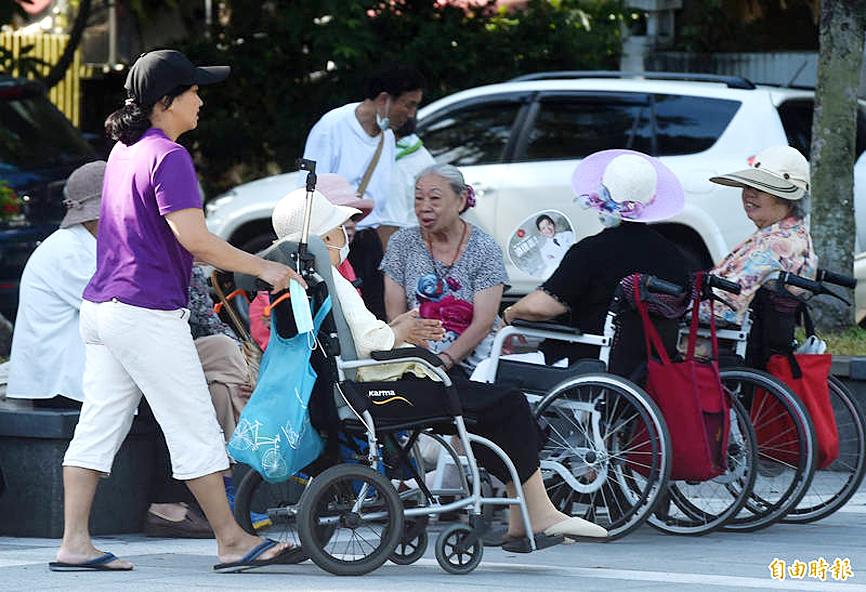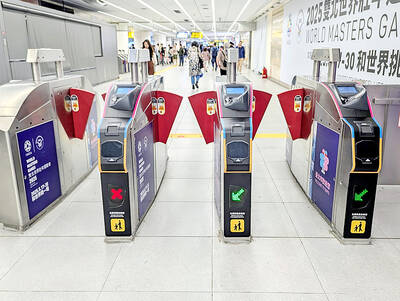Taiwan plans to raise the minimum monthly wage for live-in migrant caregivers and domestic helpers from NT$17,000 to NT$20,000, following progress in talks with Indonesia, where most of Taiwan’s caregivers originate, a labor official said on Thursday.
Indonesia last month agreed to exempt Taiwan from its zero-placement fee policy, and to resume processing applications of new caregivers to work in Taiwan after a series of talks, said Paul Su (蘇裕國), head of the Workforce Development Agency’s Cross-Border Workforce Management Division.
Indonesia in March halted Taiwan-based applications from new caregivers due to resistance from Taiwanese employers toward Indonesia’s zero-fee policy, which Su said has been introduced in Singapore and Hong Kong.

Photo: Taipei Times
Indonesia since 2000 has been pushing for foreign employers to pay workers’ placement costs, including flight tickets, passport and visa fees, and labor brokerage payments.
Ministry of Labor data as of June 30 showed that there were 218,372 migrant caregivers and domestic helpers working in Taiwan, including 164,786 from Indonesia, 27,315 from Vietnam and 25,867 from the Philippines.
The minimum monthly wage for live-in caregivers and domestic helpers is NT$17,000, lower than the national minimum wage, as such workers are not covered by the Labor Standards Act (勞動基準法).
Only the 15,530 caregivers who work at care institutions are protected by the law, and earn the national minimum wage of NT$25,250, which also covers the 468,806 migrant workers who have industrial jobs in Taiwan.
Su said the proposal to raise the minimum wage would be sent to the employment security fund management committee of the Ministry of Labor for review before the wage increase can be formally introduced.
The committee passed a resolution in early July asking the Workforce Development Agency to submit a plan for the wage increase and supplementary measures, such as subsidies for disadvantaged employers.

A magnitude 6.4 earthquake struck off the coast of Hualien County in eastern Taiwan at 7pm yesterday, the Central Weather Administration (CWA) said. The epicenter of the temblor was at sea, about 69.9km south of Hualien County Hall, at a depth of 30.9km, it said. There were no immediate reports of damage resulting from the quake. The earthquake’s intensity, which gauges the actual effect of a temblor, was highest in Taitung County’s Changbin Township (長濱), where it measured 5 on Taiwan’s seven-tier intensity scale. The quake also measured an intensity of 4 in Hualien, Nantou, Chiayi, Yunlin, Changhua and Miaoli counties, as well as

Credit departments of farmers’ and fishers’ associations blocked a total of more than NT$180 million (US$6.01 million) from being lost to scams last year, National Police Agency (NPA) data showed. The Agricultural Finance Agency (AFA) said last week that staff of farmers’ and fishers’ associations’ credit departments are required to implement fraud prevention measures when they serve clients at the counter. They would ask clients about personal financial management activities whenever they suspect there might be a fraud situation, and would immediately report the incident to local authorities, which would send police officers to the site to help, it said. NPA data showed

ENERGY RESILIENCE: Although Alaska is open for investments, Taiwan is sourcing its gas from the Middle East, and the sea routes carry risks, Ho Cheng-hui said US government officials’ high-profile reception of a Taiwanese representative at the Alaska Sustainable Energy Conference indicated the emergence of an Indo-Pacific energy resilience alliance, an academic said. Presidential Office Secretary-General Pan Men-an (潘孟安) attended the conference in Alaska on Thursday last week at the invitation of the US government. Pan visited oil and gas facilities with senior US officials, including US Secretary of the Interior Doug Burgum, US Secretary of Energy Chris Wright, Alaska Governor Mike Dunleavy and US Senator Daniel Sullivan. Pan attending the conference on behalf of President William Lai (賴清德) shows a significant elevation in diplomatic representation,

The Taipei MRT is to begin accepting mobile payment services in the fall, Taipei Rapid Transit Corp said on Saturday. When the company finishes the installation of new payment units at ticketing gates in October, MRT passengers can use credit cards, Apple Pay, Google Pay and Samsung Pay, the operator said. In addition, the MRT would also provide QR payment codes — which would be compatible with Line Pay, Jkopay, iPass Money, PXPay Plus, EasyWallet, iCash Pay, Taiwan Pay and Taishin Pay — to access the railway system. Currently, passengers can access the Taipei MRT by buying a single-journey token or using EasyCard,